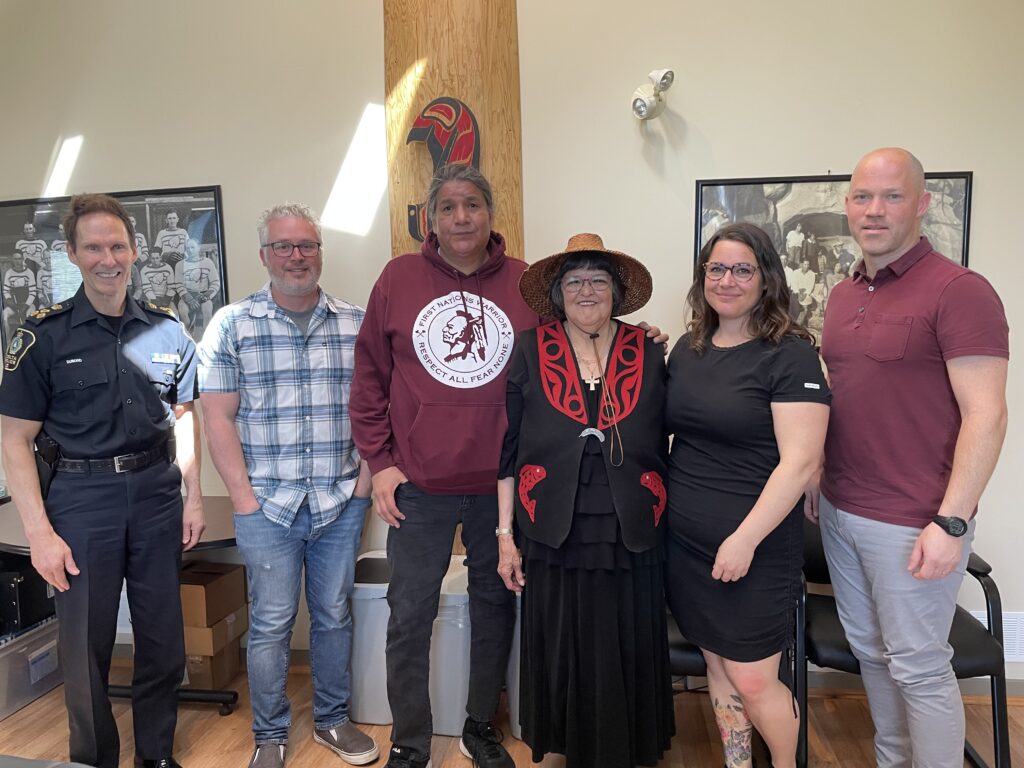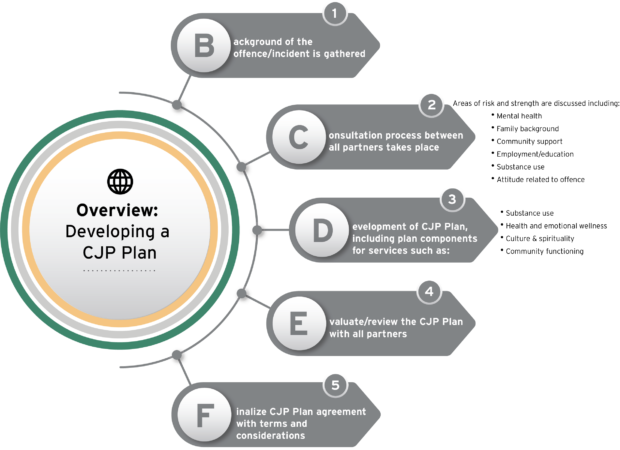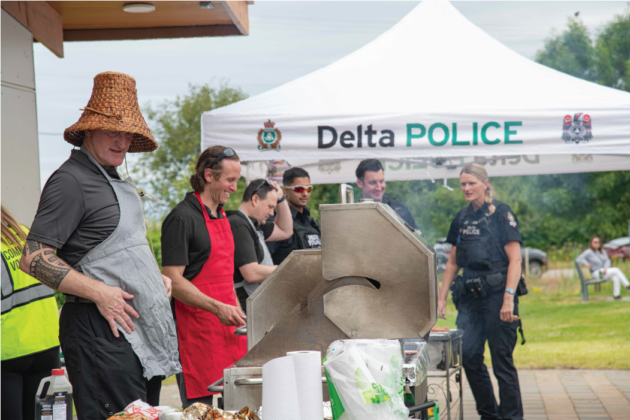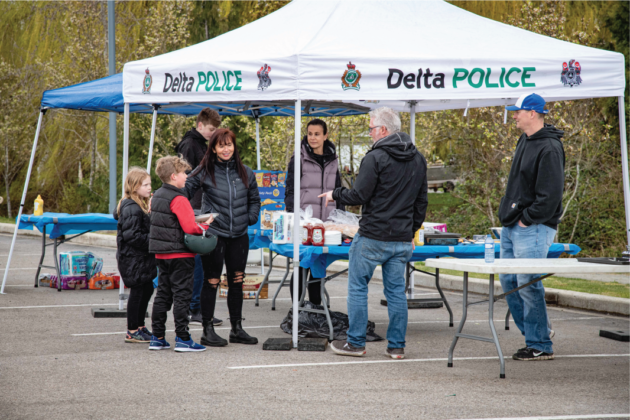
Features
A transformative justice model on Tsawwassen First Nation: From “traditional criminal justice” to “Indigenous community justice”
September 27, 2023 By Neil Dubord and Jassie Ram (Padda)
 From left to right: Chief Neil Dubord, Cst. Mike Tegart, Supervisor of Social Services Virgil Awasis, Elder Ruth Adams, Manager of Health and Social Services Katie Alexander and Probation Officer Tyler Curll. Photo: Delta Police Department
From left to right: Chief Neil Dubord, Cst. Mike Tegart, Supervisor of Social Services Virgil Awasis, Elder Ruth Adams, Manager of Health and Social Services Katie Alexander and Probation Officer Tyler Curll. Photo: Delta Police Department Overrepresentation of Indigenous peoples in the Canadian criminal justice system is an ongoing issue that has received significant attention, including investigation through various inquiries, commissions and mentions by the Supreme Court of Canada. In addition, the Supreme Court of Canada noted that the “[t]he figures are stark and reflect what may fairly be termed a crisis in the Canadian criminal justice system. The drastic overrepresentation of [A]boriginal peoples within both the Canadian prison population and the criminal justice system reveals a sad and pressing social problem.”1
Reconciliation efforts require that institutions do more than simply acknowledge or highlight Indigenous overrepresentation in the justice system. Stakeholders, organizations and levels of government must collectively work to develop pathways to resolution. While several initiatives are underway at the federal and provincial levels, it’s important for local communities, including the police, to work collaboratively to develop and implement grassroots solutions to divert individuals away from the traditional criminal justice system.
Since 2006, the Delta Police Department (DPD) has been providing contracted policing services with Tsawwassen First Nation (TFN). The DPD has a dedicated Tsawwassen First Nation Service Team (TFNST) delivering respectful and culturally sensitive community-first policing services to TFN. A critical element of the TFNST includes an embedded DPD Liaison Officer who forges relationships with TFN members and stakeholders.
As a police service committed to supporting community wellness at TFN, DPD has partnered with B.C. Corrections and TFN Government to develop the Community Justice Program (CJP). The CJP’s objective is to mitigate the overrepresentation of Indigenous peoples in the criminal justice system through a united effort that centers on the three C’s: client, community and connection to culture.
The CJP and plans
The CJP combines traditional criminal justice elements (police, courts, community corrections and prosecutors) with Indigenous community justice elements (community, elders, culture/ceremony, spirituality and restoration of balance). The CJP effectively blends two justice systems with the goal of diverting clients who have come into contact with the traditional criminal justice system and providing them with comprehensive wrap-around supports and services.
When a TFN Member, including a youth, commits a summary offence2, DPD’s TFN Liaison Officer, Cst. Tegart, works with the CJP team to review the case with the goals of proceeding with a personalized Community Justice Program Plan and advocating to keep the individual in the community. In summarizing his role in the CJP, Cst. Tegart states that “a big part of my job as the Liaison Officer is to engage all levels of the justice system, working with probation and Crown Counsel to find the best possible solution for the individual.”
The process of developing a CJP plan is guided by open communication, respect and recognition, and transparency to divert the individual and help them heal within the community. Moreover, the CJP plans are pliable, with recognizing that not everything may go as planned and flexibility may be required to ensure client success.

Photo: Delta Police Department
Overview: Developing a CJP Plan
- Background of the offence/incident is gathered
- Consultation process between all partners takes place
- Areas of risk and strength are discussed including: Mental health, family background, community support, employment/education, substance use, and attitude regarding the offence
- Development of CJP plan, including plan components for services such as: Substance use, health and emotional wellness, culture and spirituality, and community functioning
- Evaluate/review the CJP plan with all partners
- Finalize CJP plan agreement with terms and considerations
Did you know: The TFN CJP team efforts have resulted in no youth being criminally changed on the TFN in at least the past five years.
A dedicated team with familiar faces
Support from TFN leadership and the community brings together committed individuals who make up the CJP team and are all vital in its success. Every individual, as noted below, is involved in all stages of a CJP plan, from consultation to finalization. The team leads meaningful change and builds relationships amongst everyone involved.
- Katie Alexander, Health and Social Services Manager, Tsawwassen First Nation
- Virgil Awasis, Family Empowerment Worker, Tsawwassen First Nation
- TFN Elder Xʷǝsteniya (Ruth Mary Adams), Advisor, Tsawwassen First Nation
- Cst. Mike Tegart, TFN Liaison Officer, Delta Police Department
- Tyler Curll, Probation Officer, B.C. Corrections
Additionally, the CJP team works with a dedicated Crown Counsel from the B.C. Prosecution Service and TFN community members, including Elders.
A team of dedicated liaisons/representatives from various criminal justice organizations is crucial to the success of the CJP. Virgil Awasis, reflecting on past experiences, notes that criminal justice organizations are often “faceless institutions” with processes that do not work because there is not a direct contact who takes ownership and accountability for the process.
The CJP is addressing this concern by placing “faces” on these organizations; Cst. Tegart representing DPD, and Tyler Curll representing B.C. Corrections. This is an essential step in building trust with TFN members and in addressing the historical and ongoing effects of colonial systems.

Photo: Delta Police Department
The three C’s
- Client-centered
CJP plans are client centered as they focus on helping the client embark on a healing journey by recognizing and addressing intergenerational trauma impacts. The client is involved in creating a healing plan for themselves by identifying their goals and making decisions, creating personal accountability during the process. A partnership between the client and the CJP team is fostered through the plan’s consultation and development process by encouraging clients to participate in creating their personalized programs. As Curll notes, “in our program, power is shared and decisions are collaborative.”
- Community-centered
When an offence is committed, it impacts the entire community. As such, CJP plans are created involving clients, their families and the community to ensure client success. Additionally, Indigenous Elders and community champions are consulted with to provide traditional knowledge and grassroots community support. Cst. Tegart captures the community-centered nature of the CJP plans, stating that “the program encourages me to look at policing through a different lens. It’s about engaging and building relationships with the community.”
- Connection to culture-centered
CJP plans are connection-centered as they incorporate elements of Indigenous culture, identity and tradition. The plans encourage individuals who may have lost connection to their culture to reclaim spiritual and cultural elements related to land, family, ceremony and language, guided by Elders and community champions. Cultural connection benefits both clients and stakeholders, including justice institutions, through creating respect and understanding of the importance of Indigenous cultures and practices.
Impact of the Community Justice Program
The CJP is successful and making positive impacts for TFN Members due to its collaborative and personalized process. The success of the CJP is determined by those who have completed the program and the reduction of Indigenous people entering the traditional criminal justice system. Those who have completed the program provide positive feedback, noting that they feel heard and respected, attesting to the value of active consultation with all stakeholders, including the clients.

Members of DPD cooking BBQ lunch on TFN lands for National Indigenous Peoples Day. Photo: Delta Police Department
CJP Impacts
- 100 per cent successful completion of all CJP plans
- Positive relationships built between communities and justice systems
- Improved connection with community/culture
- Decrease in recidivism and administrative breaches
- Increase in family and community involvement towards individual and community wellness
- Significant increases in TFN Members attending drug and alcohol treatment services and increases in positive results when returning to community
The biggest success has been the ability to use the CJP for youth cases, resulting in no youth being criminally charged on Tsawwassen Lands in at least the past five years. As Virgil notes, “the program is changing the landscape for future generations, seeds are being planted and over time, this will result in a whole generation of youth who have not been charged and entered in the criminal justice system.”

Members of DPD Tsawwassen First Nation Service Team serving lunch on TFN Treaty Day. Photo: Delta Police Department
Concluding remarks
The TFN CJP—in alignment with Article 34 of the United Nations Declaration of the Rights of Indigenous Peoples (UNDRIP)3—is a step forward on the path to reconciliation. The CJP’s collaborative and united effort from the team, Tsawwassen Members, and the community has contributed to its success. It is essential to invite stakeholders to sit at one table together with the community to create innovative approaches with a focus on providing wraparound services. While the CJP is primarily for summary offences, elements of client, community and connection-centered approaches provide a holistic framework for considering other restorative justice initiatives.
References and end notes
- R. v. Gladue, [1999] 1 S.C.R. 688.
- Summary offences are the least serious kind of criminal offences under the Canadian Criminal Code. The maximum penalty for a summary offence is usually a $5,000 fine and/or six months in jail. Some summary offences have higher maximum sentences.
- United Nations Declaration on the Rights of Indigenous Peoples, accessed at https://social.desa.un.org/issues/indigenous-peoples/united-nations-declaration-on-the-rights-of-indigenous-peoples.
Neil Dubord is the Chief Constable of the Delta Police Department.
Jassie Ram (Padda) is the Corporate Services Manager, working with the Office of the Chief Constable at the Delta Police Department.
Print this page